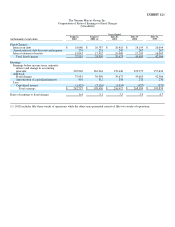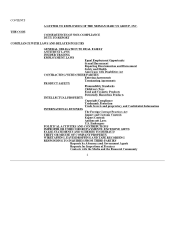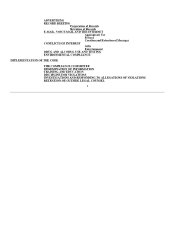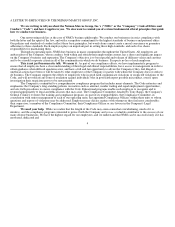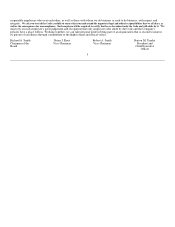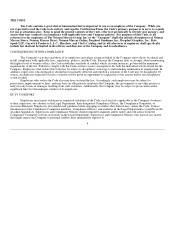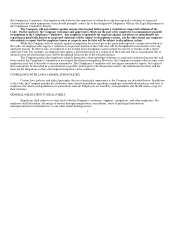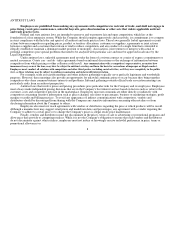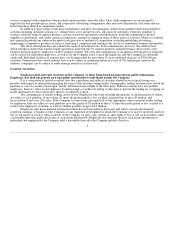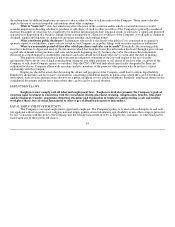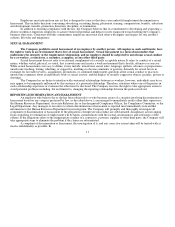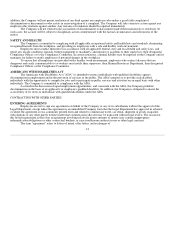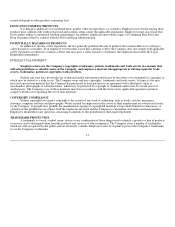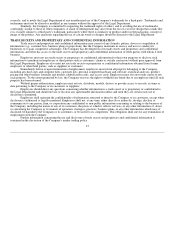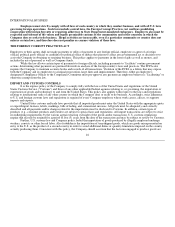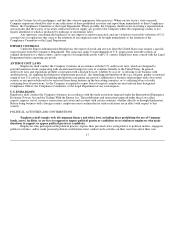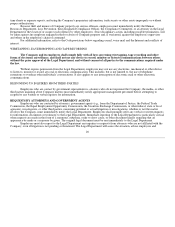Neiman Marcus 2002 Annual Report Download - page 147
Download and view the complete annual report
Please find page 147 of the 2002 Neiman Marcus annual report below. You can navigate through the pages in the report by either clicking on the pages listed below, or by using the keyword search tool below to find specific information within the annual report.
the information. In addition, employees are never to advise others to buy or sell securities of the Company. These same rules also
apply to the use of material nonpublic information about other companies.
What is "material"? Any fact which may affect the price of the securities and/or which a reasonable investor would
consider important in deciding whether to purchase or sell shares of stock or other securities of the Company is generally considered
material. Examples of what may be considered to be material information include: financial results or forecasts; a significant proposed
acquisition or disposition of a business; hiring, firing or resignation of a Director or Officer of the Company; a stock split or change in
dividend; significant litigation; or changes in customary earnings and earnings trends.
What constitutes public disclosure? Information effectively is disclosed to the public if it is contained in an annual or
quarterly report to stockholders, a press release issued by the Company, or in public filings with securities regulatory authorities.
What is a reasonable period of time after which purchases and sales can be made? Essentially, the investing public
must have had time to digest and analyze the information which has been disclosed. For information disclosed through a press release,
a good rule of thumb is that purchases and sales can be made beginning two (2) business days after the release. For information
disclosed in a report mailed to stockholders, purchases and sales should not be made until one (1) week after the date of mailing.
The purpose of this discussion is not to present an exhaustive statement of the law with respect to the use of inside
information, but to advise you of legal considerations whenever you either purchase or sell shares of stock or other securities of the
Company or talk about Company matters to outsiders. Only the CEO, CFO and individuals specifically designated by them are
authorized to discuss Company affairs with securities analysts, members of the press, or other persons who do not have a direct
relationship with the Company.
Employees should be aware that discussing the affairs and prospects of the Company could lead to serious legal liability.
Employees should take care not to have conversations concerning confidential matters in public areas where they can be overheard or
intercepted, such as on an airplane, in an elevator, on a public telephone or on a cellular telephone. Similarly, employees should secure
confidential documents and not leave them where they can be read by a casual observer.
EMPLOYMENT LAWS
Employees must comply with all labor and employment laws. Employees shall also promote the Company's goals of
ensuring equal treatment in connection with the recruitment, hiring, placement, training, compensation, benefits, education
and development, transfer, promotion, demotion, discipline and termination of employees and providing a safe and healthy
workplace that is free of sexual harassment or other types of illegal harassment or misconduct.
EQUAL EMPLOYMENT OPPORTUNITY
The Company is an equal employment opportunity employer. The Company's policy is to deal with each employee and each
job applicant without regard to race, religion, national origin, gender, sexual orientation, age, disability or any other category protected
by law. Consistent with this policy, the Company will not tolerate harassment of or by its employees, customers, or other third parties
based upon any of these protected classes.
10


